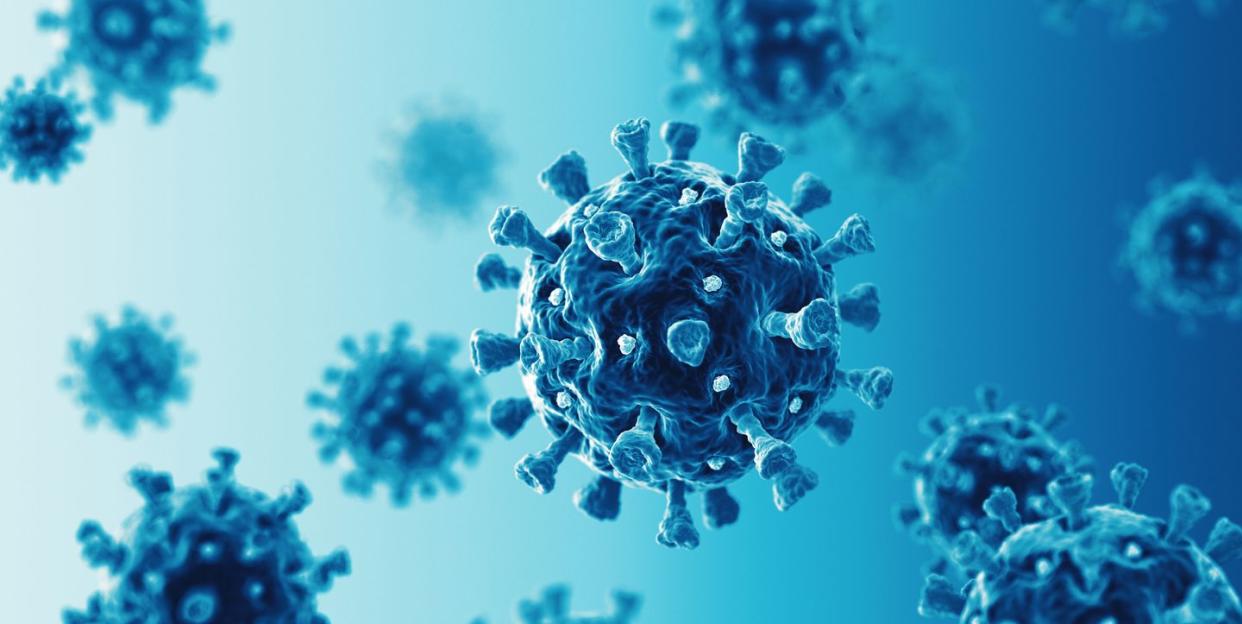Why a Common Heartburn Drug Is Being Studied as a Possible Coronavirus Treatment

Scientists are studying famotidine, the active ingredient in the heartburn medication Pepcid, as a possible treatment for COVID-19.
As part of a clinical trial, patients at New York City’s Northwell Health have been receiving famotidine intravenously in a large dose.
Doctors say there is no reason to stockpile Pepcid and warn against self-medicating, as it can come with side effects.
As of right now, there is no set treatment or cure for COVID-19, the respiratory illness caused by then novel coronavirus. Instead, doctors focus on treating the symptoms of patients as they develop—and they vary widely, from a fever to difficulty breathing. While the drug hydroxychloroquine (used to treat malaria) has been discussed as a possible remedy, there is currently limited evidence to suggest it actually works.
Now, there’s a new drug that scientists are looking into as a potential COVID-19 treatment: famotidine, which is the active ingredient in the popular heartburn medication, Pepcid.
As part of a clinical trial, patients at New York City’s Northwell Health have been receiving famotidine intravenously, at a dose that’s nine times greater than what people typically take for heartburn, says Matthew Libassi, a spokesperson for Feinstein Institutes for Medical Research at Northwell Health. The trial is aiming to enroll 1,174 people and Libassi says that more than 180 patients who are hospitalized with the virus are currently enrolled.
As of now, there isn’t much information on what, exactly, this drug can do, and Libassi says it’s too soon to comment on how well the trial is going. But why are experts looking at famotidine as a possible COVID-19 treatment in the first place? Here’s what you need to know.
What is famotidine, exactly?
Famotidine is in a class of medication called H2 blockers, and it works by decreasing the amount of acid made in the stomach, according to the U.S. National Library of Medicine.
Prescription famotidine is typically used to treat ulcers, gastroesophageal reflux disease, and conditions where the stomach produces too much acid. You’re probably more familiar with over-the-counter famotidine, which is used to prevent or treat heartburn due to acid indigestion and a sour stomach.
How effective is famotidine in treating COVID-19?
It’s unclear at this point, but there has been previous, unpublished research linking famotidine to better outcomes with COVID-19 patients. According to Science, a review of 6,212 COVID-19 patient records in China found that many survivors suffered from chronic heartburn and were on famotidine. Patients who were hospitalized with COVID-19 and were on famotidine died at a rate of 14% compared with 27% for people who were not taking the drug, including those who took the more expensive heartburn drug, omeprazole (Prilosec).
But, again, that particular study has not been peer-reviewed or even published. “This was not a rigorously tested finding, only an anecdotal observation,” says Adam Lauver, Ph.D., an assistant professor of pharmacology and toxicology at Michigan State University. “Famotidine is cheaper than omeprazole, so there are many socioeconomic variables that could also be responsible for the observed effect.” This is one of many things that would need to be controlled for if the study moved on to peer review.
But there are other theories around a potential mechanism. “The current hypothesis for why famotidine may be effective in treating coronavirus is that it may bind to a viral enzyme (protease) that helps the virus replicate,” explains Robert Weber, Pharm.D., a pharmacy administrator at The Ohio State University Wexner Medical Center. “If the virus cannot replicate, or multiply, the viral levels will be reduced.”
As for the study currently being conducted at Northwell Health hospitals, it’s based on “anecdotal reports from China and molecular computer modeling that suggested famotidine could be effective,” Libassi says.
However, that doesn’t mean you should start taking Pepcid, as it can come with side effects.
“We want to stress that the dosage is nine times higher than what you’d get at a drugstore,” Libassi says. “There’s no reason to go out and stockpile Pepcid. It’s not going to do any benefit. This is a controlled trial in a hospital system, under the care of physicians.”
Famitodine also comes with potential side effects like headache, diarrhea, and constipation, the Food and Drug Administration (FDA) says, and, in rare cases, could even impact your kidney function.
Dr. Lauver’s lab is studying the potential heart issues with several drugs touted to help with COVID-19, and he has some concerns. “While safer than chloroquine and hydroxychloroquine, famotidine is still classified as a ‘conditional risk’ for arrhythmia (irregular heartbeat),” he says. “This means that in some patients with risk factors like kidney failure, which impairs the body’s ability to clear the drug, famotidine may cause electrical changes in the heart that can cause arrhythmia.”
Dr. Weber emphasizes that it’s “definitely not” safe to self-medicate with famotidine for COVID-19. “The use of famotidine is unproven and needs to be tested in a clinical trial,” he says, especially in the context of large doses. “It is not safe to take famotidine unless prescribed by a doctor.”
Support from readers like you helps us do our best work. Go here to subscribe to Prevention and get 12 FREE gifts. And sign up for our FREE newsletter here for daily health, nutrition, and fitness advice.
You Might Also Like

